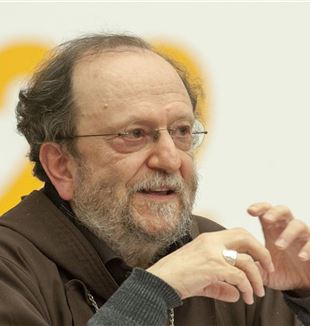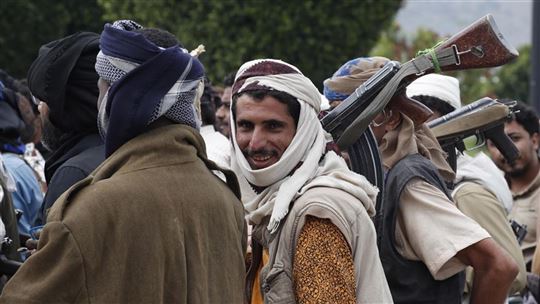
Christians in Yemen, a tenacious presence
The lingering war, the glimmers of peace. And dialogue with the Muslim world. One year after taking office, the Vicar Apostolic in Southern Arabia, Monsignor Paolo Martinelli, speaks of what is happening there.A civil war has been fought in Yemen for nearly nine years, which has now become the scene of a "power struggle" between two major powers in the region, Iran and Saudi Arabia. A bloody conflict that has claimed the lives of thousands of civilians and devastated the country. A few weeks ago, the resumption of diplomatic relations between Riyadh and Tehran, an agreement to exchange hundreds of prisoners, and a substantial truce on the ground, however, opened a path toward peace.
"I do not want to go into geopolitical analysis, but the signs we see are certainly encouraging." These are the words of Monsignor Paolo Martinelli, a Capuchin, exactly one year after his appointment as Apostolic Vicar for the region of southern Arabia (UAE, Oman and Yemen). This is a very complex area of the world where, despite the majority of the inhabitants being of the Islamic faith, there is still a substantial Christian presence estimated at about one million people. "The hope is that the conflict will end soon and reconstruction will begin. There is a great need for that."
Glimmers of peace in Yemen. How are Christians in the region experiencing this news?
It is necessary to distinguish what is happening in the Emirates and Oman from what is happening in Yemen. They are profoundly different realities. In the UAE (where the Vicariate is based today) and Oman the quality of life is very good, there is peace and prosperity. In Yemen the situation is quite different because, in fact, the war is not yet formally over. Hopes are certainly high and we all hope that things will turn for the better, even if credible news is hard to come by.
But so what is the real situation of Christians in Yemen today?
It is not possible to say how many there are because there are no records. However, albeit small, there is a Christian presence. And it is rooted. This is despite years of war, as witnessed by Mother Teresa's nuns who have always stood by the people. The fact that they are there is something very precious. They truly give their lives, they offer it entirely for those people. The Pope, just a week ago, in his catechesis on apostolic zeal, devoted space to the theme of martyrdom by also remembering the four Missionary Sisters of Charity who were killed in Yemen in 2016 by extremists. He called them all by name: Sister Anselm, Sister Judith, Sister Margarita and Sister Reginette. Since their martyrdom, a tenacious presence has flourished; today there are still eight nuns of their order. And with them is an Italian priest who moves from one community to another to guarantee the sacraments and a presence for the faithful who remain. Because of the conflict many Christians had to leave Yemen, especially in the early stages of the war when armed gangs ruled the country. However, some have remained. And the hope is that slowly all will be able to return.
Did you manage to meet these people?
Although it is a great desire of mine, so far I have not yet been able to meet the community of Yemen. But we have continuous exchanges, we talk regularly. In fact, in one of the last conversations, the priest there confirmed to me that things are getting better; for example, today they can move around, although they always have to do it together and by car. Before it was very dangerous. The two communities of the Little Sisters of Mother Teresa are very well known. They had been wanted by the government itself, which had recognized their usefulness and humanity. Even today they are still well-liked for the exceptional charity work they do, especially in two homes for the elderly and psychophysically disabled. Their daily routine is to serve these people, just as the priest who is with them does. A life spent in service, caring for others. With or without war.
You talked about the flight of Christians at the beginning of the war and the possibility of them returning. Might that happen?
It is too early to say. The situation is still very delicate. Some churches in Yemen have been destroyed or damaged and will have to be rebuilt. I am thinking of the one in Aden, which was the first seat of the vicariate, with an ancient tradition. And for people it is no different. Everything will have to be rebuilt. And then, as we were saying, there are also Yemeni Christians who have always lived there, natives. And who bear a great witness of faith.
What is the situation in the Emirates and Oman?
In the Emirates, Christians are there mainly for work. That is why I always say that ours is an authentic "Church of migrants." The faithful are migrants. The bishop is migrant, as are the priests and religious. There is no other place in the world where the Church is so diverse and at the same time in dialogue with the Muslim world in which it lives.
Speaking of which, for the past year you have been Vicar in the country where Pope Francis and the Grand Imam of Al-Azhar Ahamad al-Tayyib in 2019 signed the beautiful "Document for Human Fraternity." In that text there is much emphasis on the "culture of dialogue." But what does that mean in concrete terms?
Here in the Emirates, dialogue is an established reality. The government has put a lot of effort into it; there is even a ministry dedicated to hospitality ("tolerance") and coexistence. That document certainly marked a turning point thanks to which, in recent years, meetings, relationships, friendships have been born... Every year this event is commemorated with a big joint celebration and an award has even been established. But if we want to get into the concrete, a beautiful reality is the Abrahamic Family House....
What is that?
It is a place where a mosque, a Catholic church and a synagogue have been built and where an imam, a priest and a rabbi live. Somehow theirs is a shared form of life, and this Center stands to show that dialogue can really lead to a common path. Of course, it is a newly born experience, last February 16. But it is very much alive and open to everyone. We celebrate Mass there every day and have moments of coexistence with other religions. During Ramadan, when Muslims would break their fast in the evening, which is called iftar in Arabic, we were all invited to spend the evening together, eating and talking about everything. As with the rabbi, imam and priest, our whole life here is aimed at getting to know each other.
One year into your appointment, what have you discovered living there?
For me being here is a great adventure. I am going around all the parishes, meeting realities that constantly amaze me because they are so different from the reality where I was before, in Italy. The churches here are always packed for Mass, often we cannot even get everyone in, the desire to belong to the Christian story is great. Theirs is an enthusiasm to learn from. Of course, sometimes there is no lack of tension because it is not always easy to harmonize the different communities, which have different rites and languages, but I realize that these are problems that arise, after all, from attachment to the life of the Church, from love for Jesus Christ. These months alongside these people have made me stand before the mystery of God, the face of Christ.
Read also - Ukraine: safeguard your heart
What fascinates you the most? Do you not feel alone in your mission?
Two tough questions. I am fascinated by the cross-cultural capacity of the Christian faith: it is an aspect of God's faith that is mysterious and that is why I ask the Lord every day to understand more. When I celebrate Mass I see in front of me Filipinos, Indians, Lebanese living the adventure of faith together and my heart fills with gratitude. How is all this possible? The Holy Spirit is really accomplishing something exceptional here. That is also why – and here is my response to the second question – I do not feel alone. There are so many priests, women and men religious, families, students... And there is the friendship with Bishop Emeritus Paul Hinder, my predecessor, which helps me so much. Think about those nuns in Yemen, that priest. They do not feel alone, they experience a deep communion. And if it is possible for them...